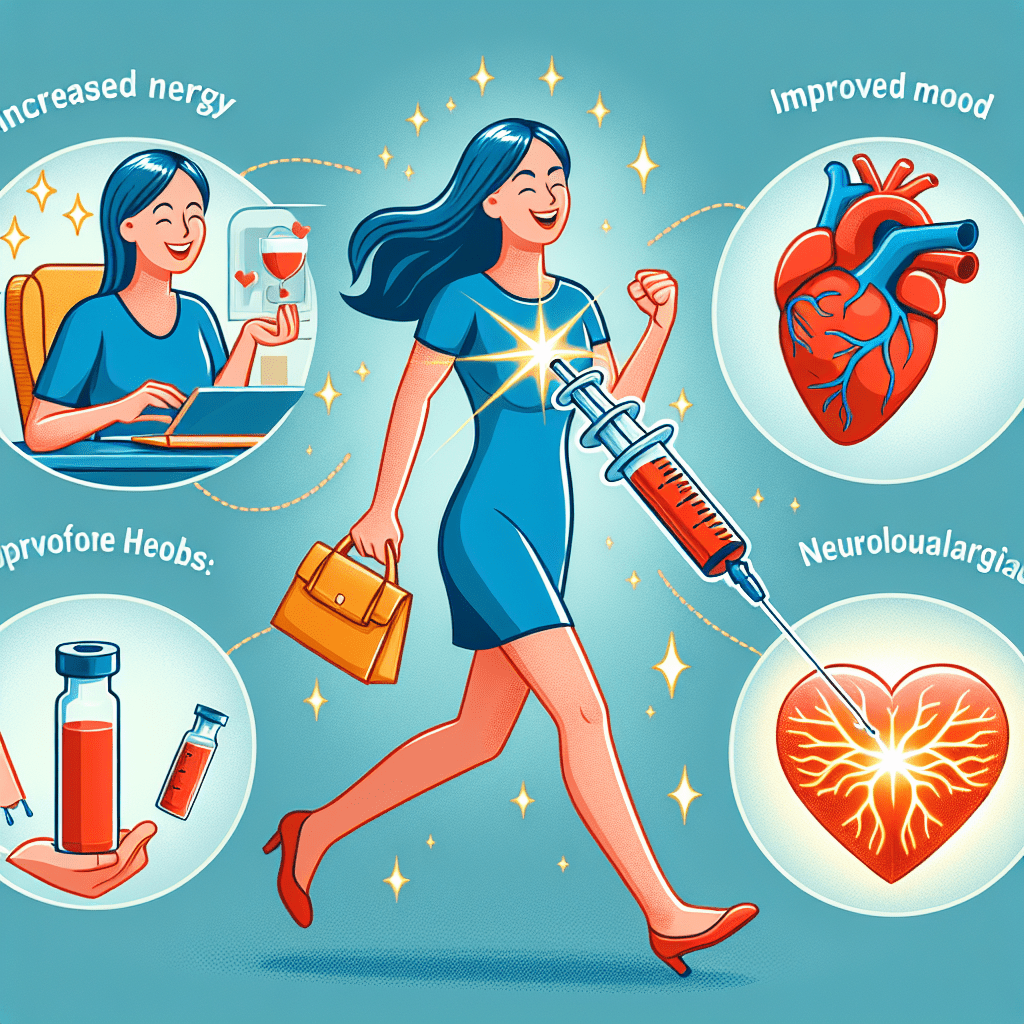
Vitamin B12 plays a crucial role in maintaining overall health, supporting nerve function, red blood cell production, and energy metabolism. For many individuals, especially those with a vitamin B12 deficiency, B12 injections offer a direct and effective way to replenish this essential nutrient. These injections are commonly used not only to address deficiencies but also to boost energy levels and improve mental clarity, making them a popular choice among people seeking a natural lift in their daily vitality.
While the benefits of a B12 shot are well recognized, one question often arises: when is the best time to take a B12 injection; day or night? Understanding the optimal timing can help maximize the effectiveness of the vitamin B12 supplement and avoid any potential disruptions to sleep or daily routines. Since B12 injections can influence energy levels, the timing of the injection may impact how you feel throughout the day or night.
For those interested in learning more about the benefits and uses of a B12 shot, it’s important to consider how timing fits into your overall health strategy. Whether you’re managing a deficiency or simply looking to enhance your energy, knowing when to take your vitamin B12 injection can make a meaningful difference in your wellness journey.

Understanding how B12 injections work in the body
Absorption and metabolism of B12 through injections
Vitamin B12 injection offers a unique advantage over oral vitamin B12 supplements because it bypasses the digestive system entirely. When taken orally, vitamin B12 must pass through the stomach and intestines, where absorption can be limited by factors such as low stomach acid, digestive disorders, or age related decline in absorption efficiency. In contrast, a B12 shot delivers the vitamin directly into the muscle or bloodstream, allowing for faster and more complete absorption. This direct delivery ensures that the body receives an adequate amount of vitamin B12, which is essential for many physiological processes.
Once absorbed, vitamin B12 plays a vital role in energy production by aiding in the conversion of food into usable energy at the cellular level. It is also critical for neurological function, supporting the maintenance of healthy nerve cells and the synthesis of DNA. For individuals experiencing symptoms of vitamin B12 deficiency, such as fatigue, weakness, or cognitive difficulties, a vitamin B12 injection can provide a more immediate and noticeable improvement compared to oral supplements.
Duration of the effects of a B12 shot
The effects of a B12 shot can vary depending on several factors, but generally, increased vitamin B12 levels in the body can last from a few days to several weeks. After an injection, vitamin B12 is stored in the liver and released gradually, which helps maintain adequate levels over time. For many people, a single injection can provide benefits that last anywhere from two to four weeks, though this duration may be shorter or longer depending on individual health status and the severity of deficiency.
People with severe vitamin B12 deficiency or certain medical conditions may require more frequent injections to maintain optimal levels. The B12 injection dosage and shot frequency are often tailored by healthcare providers based on blood test results and symptom improvement. It’s important to monitor vitamin B12 levels regularly to ensure that the treatment remains effective and to avoid potential side effects from excessive dosing.
Influences of other factors on B12 effectiveness
While vitamin B12 injections are highly effective in raising B12 levels, their overall impact can be influenced by diet, lifestyle, and existing health conditions. For example, individuals who follow a strict vegan or vegetarian diet may be more prone to B12 deficiency because this vitamin is primarily found in animal products. In such cases, a vitamin B12 supplement or injection can be an essential part of maintaining health.
Other factors such as alcohol consumption, smoking, and certain gastrointestinal disorders like Crohn’s disease or pernicious anemia can impair vitamin B12 absorption and metabolism, making injections a preferred method of treatment. Additionally, some medications, including metformin and proton pump inhibitors, may interfere with vitamin B12 absorption, necessitating closer monitoring and possibly more frequent B12 injections.
Understanding these influences helps ensure that vitamin B12 therapy is personalized and effective. Consulting with a healthcare professional can help identify any underlying issues that might affect the success of B12 deficiency treatment and guide appropriate adjustments in dosage or frequency.

Benefits and drawbacks of taking B12 injections during the day
Potential energy boost during waking hours
One of the most commonly cited reasons for choosing to take a vitamin B12 injection during the day is the potential for an energy boost. Vitamin B12 plays a key role in converting food into energy, and many people report feeling more physically and mentally alert after receiving a B12 shot for energy. This can be especially beneficial for those experiencing vitamin B12 deficiency symptoms such as fatigue, weakness, or difficulty concentrating.
By supporting physical and mental alertness, daytime B12 injections may help individuals stay focused and productive throughout their daily activities. Whether it’s managing work tasks, exercising, or simply maintaining an active lifestyle, the B12 injection benefits can contribute to improved stamina and reduced feelings of tiredness. For people who rely on a vitamin B12 supplement to maintain their energy levels, timing the injection during waking hours aligns well with their natural activity patterns.
Alignment with daily activity patterns
Taking a B12 injection during the day also aligns with the body’s natural circadian rhythms and energy needs. The circadian rhythm governs sleep wake cycles and influences when the body feels most alert or tired. Since vitamin B12 can enhance energy metabolism, administering the injection in the morning or early afternoon may complement these natural rhythms, helping to optimize alertness when it is most needed.
Additionally, daytime injections offer convenience in scheduling and monitoring effects. Receiving a B12 injection during regular hours makes it easier to observe how the body responds, track any changes in energy or mood, and adjust the B12 injection dosage or frequency accordingly. For those seeking B12 deficiency treatment, this practical approach can improve adherence to therapy and overall satisfaction with the treatment plan.
Possible concerns or side effects from daytime injections
While many people tolerate vitamin B12 injections well, some may experience side effects or concerns related to daytime administration. A small number of individuals report feeling overstimulated or jittery after a B12 energy shot, which could interfere with their ability to focus or remain calm. These effects are generally rare and tend to vary based on individual sensitivity and health status.
It’s important to recognize that responses to vitamin B12 therapy can differ widely. Some people may find that a daytime injection enhances their energy without any negative effects, while others might prefer a different timing to avoid potential overstimulation. Consulting with a healthcare provider can help identify the best approach based on personal health history and lifestyle.
Overall, the benefits of taking a vitamin B12 injection during the day often outweigh the drawbacks for those seeking to improve energy and alertness. However, being mindful of individual differences and possible side effects ensures that B12 injection benefits for health are maximized safely and effectively.

Benefits and drawbacks of taking B12 injections at night
Impact on sleep quality and relaxation
The relationship between vitamin B12 injections and sleep quality is complex and varies from person to person. Some individuals report that taking a vitamin B12 injection at night does not interfere with their ability to fall asleep or stay relaxed, while others experience mixed effects. Because vitamin B12 plays a role in energy metabolism, there is a concern that a B12 energy shot administered too close to bedtime might disrupt restfulness or cause difficulty falling asleep.
However, scientific evidence on this topic remains limited and inconclusive. For some, vitamin B12 may even support the regulation of circadian rhythms, potentially promoting better sleep patterns. Personal sensitivity to stimulants and individual differences in metabolism can influence how a nighttime injection affects sleep. Those who are particularly sensitive to changes in energy levels might find that a nighttime vitamin B12 injection leads to restlessness, while others may experience no noticeable impact on their sleep quality.
It is important to pay attention to how your body responds to a vitamin B12 injection at night and adjust timing accordingly. If sleep disturbances occur, switching to a daytime injection might be a better option to maintain both energy and restful sleep.
Convenience for certain routines or schedules
For some people, taking a vitamin B12 injection at night can offer practical advantages. Evening administration may simplify self care routines or medical regimens, especially for those who have busy daytime schedules or multiple daytime commitments. Incorporating a B12 injection into an evening routine can make it easier to remember and maintain consistent B12 shot frequency, which is important for effective B12 deficiency treatment.
Additionally, nighttime injections can help avoid interruptions during the day, allowing individuals to focus on work, family, or other responsibilities without the need to schedule appointments or manage side effects during active hours. This convenience can improve adherence to vitamin B12 therapy and overall satisfaction with treatment.
For people who prefer to receive their vitamin B12 injection near me at a clinic or pharmacy, evening hours may also offer more flexible appointment options. This can be particularly helpful for those balancing multiple health needs or managing other medications and supplements.
Potential risks or limitations of nighttime injections
Despite the convenience, there are potential risks and limitations associated with taking a vitamin B12 injection at night. One of the main concerns is the possibility of interference with falling asleep. For individuals sensitive to the stimulating effects of a B12 energy shot, nighttime injections might lead to difficulty relaxing or prolonged wakefulness, which can negatively impact overall sleep quality and next day energy levels.
Another limitation is that the immediate energy benefits of a vitamin B12 injection may be less noticeable when taken at night. Since the body’s natural energy demands decrease during sleep, the boost in alertness and focus that some experience with daytime injections may not be as beneficial or apparent. This could reduce the perceived effectiveness of the B12 injection benefits for health in terms of daytime productivity and mental clarity.
Ultimately, the decision to take a vitamin B12 injection at night should consider individual lifestyle, health status, and response to treatment. Consulting with a healthcare provider can help determine the best timing and dosage to balance the benefits and potential side effects, ensuring that vitamin B12 therapy supports both energy needs and restful sleep.

Finding the Right Time for Your B12 Injection
Determining the best time to take a vitamin B12 injection ultimately depends on individual health goals, daily routines, and how your body responds to the treatment. For some, a B12 shot during the day offers a valuable energy boost that supports physical activity, mental focus, and overall alertness. Others may find that taking the injection at night fits better with their schedule or personal preferences, especially if it helps maintain consistency in their vitamin B12 therapy. Since vitamin B12 deficiency symptoms and treatment needs vary widely, there is no one size fits all answer. Paying close attention to how your body reacts to the timing of the injection can help you identify what works best for you, whether that means morning, afternoon, or evening administration.
It’s also important to consider lifestyle factors such as work demands, sleep patterns, and other health conditions when deciding on the timing of your B12 shot. For example, if you experience sensitivity to stimulants or have trouble sleeping, daytime injections might be preferable. Conversely, if your schedule is hectic during the day, nighttime injections could offer a more convenient option. Understanding these nuances allows you to maximize the B12 injection benefits for health while minimizing any potential side effects or disruptions to your daily life.
Consulting with a healthcare provider is a crucial step in tailoring your vitamin B12 injection schedule to your unique needs. Medical professionals can assess your vitamin B12 deficiency symptoms, recommend appropriate B12 injection dosage and frequency, and help monitor your progress. They can also provide guidance on how to balance vitamin B12 therapy with other supplements or medications you may be taking. By working closely with a healthcare provider, you can ensure that your B12 deficiency treatment is both safe and effective, helping you achieve optimal health and well being.
Back to Blog post list

